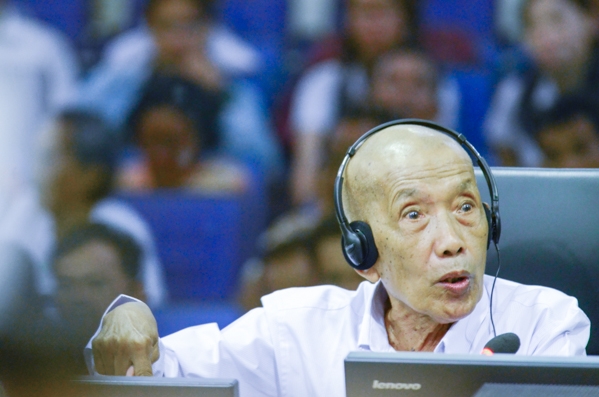Attempting to draw links between Khmer Rouge leader Nuon Chea and infamous Khmer Rouge detention center S-21 prison, Assistant Prosecutor Dale Lysak spent most of the day grilling Kaing Guek Eav, known as Duch to many, on the stand yesterday during Case 002/02 at the Khmer Rouge Tribunal.
Mr. Guek Eav, the first Khmer Rouge leader convicted of crimes against humanity in 2010 and sentenced to life in prison, spoke openly about Mr. Chea’s connections to the prison despite his relative reluctance later on to admit that soldiers of the Lon Nol regime had been arrested and killed at the detention center.
Mr. Lysak preempted Mr. Guek Eav’s testimony with a 2012 statement from Mr. Chea denying any connection to the prison.
“I have never been responsible for the operation of S-21. What Duch accused me of is unjust,” Mr. Chea said. “I have never ordered, or received documents from Duch. I have never been the superior of Duch.”
But Mr. Guek Eav refuted that statement immediately, citing direct mention of Mr. Chea by his own superior, Son Sen, and multiple documents signed by Mr. Chea giving direct orders. He also said it was agreed upon at an official party congress that any “traitors” had to be “smashed.”
“Everything comes from the party structure. His words are nonsense,” he said.
He told a story about a specific order from Mr. Chea involving the murder of Mr. Sen’s uncle and other relatives, illustrating the frequent specificity of Mr. Chea’s orders and his hands-on involvement in the activities of the prison and the Khmer Rouge’s larger security apparatus. Before a short meeting at a school in August 1977, Mr. Guek Eav said he had not met Mr. Chea in person.
Mr. Lysak used the rest of the day to focus on the treatment of Lon Nol soldiers after the Khmer Rouge takeover of Phnom Penh. Specifically, he wanted to know who and how many soldiers passed through S-21. But Mr. Guek Eav was often unable to give him the answers he needed, either dodging questions or denying any knowledge of Lon Nol regime soldiers held in S-21.
Other than hearing second hand that government soldiers were being rounded up during the evacuation of Phnom Penh, Mr. Guek Eav was unable to directly verify any mass killings of Lon Nol soldiers.
“I had no experience dealing with former soldiers,” he said.
He did take Mr. Lysak through a shortened version of his own path to leadership, telling the court he was initially tasked with searching the homes of former Lon Nol soldiers and even Lon Nol’s home itself, gathering documents and hiding them at S-21. By October 1975, his boss was sent to the battlefront and he was chosen as his replacement.
The cross examination then turned to specific deaths at S-21, ranging from the uncle of Ta Nat, Mr. Guek Eav’s superior at S-21, and relatives of Long Boret, the prime minister from 1973 to 1975. In one instance, Mr. Guek Eav inadvertently described a horrifyingly routine practice at S-21 of prisoners being used for live surgical experiments.
But the point of the line of questioning seemed to concern the deaths of family members of notable Cambodians aligned with movements or forces opposing the Khmer Rouge, potentially pointing to involvement and direct orders from senior Khmer Rouge leaders like Mr. Chea.
When asked about the fate of the wife and young children of a professor who was killed during protests preceding the Khmer Rouge takeover of Phnom Penh, Mr. Guek Eav said he could not remember specifically what happened to them, but knew how most prisoners at S-21 ended up.
“After the revolution, if the parents were killed, the children were killed as well,” he said. “As long as he was arrested, he or she was never released.”
http://www.khmertimeskh.com/news/25872/duch--noun-chea-claims----nonsense---/
